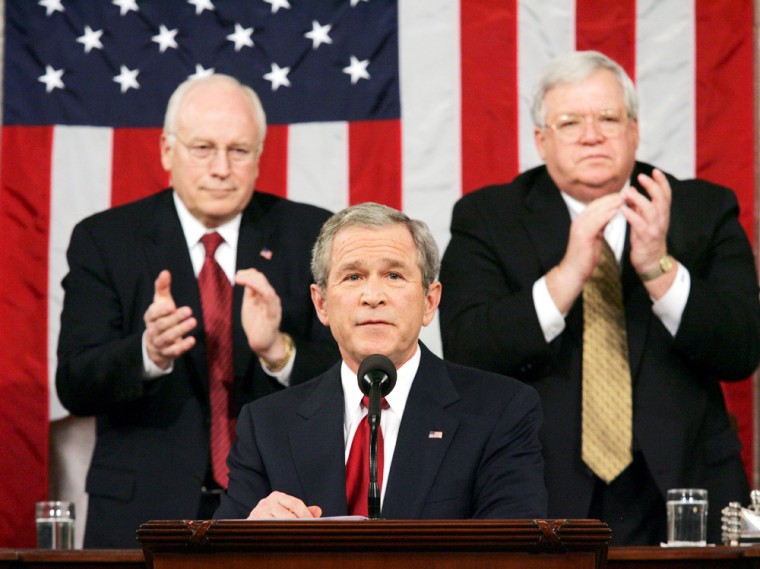President Bush left no doubt about his biggest domestic priority this year with a State of the Union address that put Social Security front and center, warning that the 70-year-old program is “headed toward bankruptcy.”
“We must join together to strengthen and save Social Security,” Bush said in the speech.
The president has been talking for months about his proposal to partially privatize Social Security, but the high-profile speech Wednesday made clear that the White House plans to ramp up the campaign in an effort to pass major legislation this year. Bush devoted nearly 25 percent of his widely watched speech to spelling out his argument for changing Social Security through a system of personal accounts.
"If steps are not taken to avert that outcome, the only solutions would be drastically higher taxes, massive new borrowing, or sudden and severe cuts in Social Security benefits or other government programs," Bush said.
Analyst Michael Tanner of the Cato Institute, a major advocate for privatizing Social Security, called Bush’s speech “the launch of the official campaign” to convince voters and members of Congress to support his plan.
Tanner and others said the president faces an uphill battle, but the odds increase substantially as the clock ticks toward 2006, when all of the House and half of the Senate is up for election.
“It has to be this year,” said Tanner. “I still think the odds are better than 50-50. This is a president who never lost a vote he wanted to win. It will be very hard to bet against him.”
Other analysts disagreed, citing well-organized opposition from some Republicans as well as Democrats. Senate Democratic leader Harry Reid was quoted this week as saying he did not “know of a single Democratic senator” who would support partial privatization. Democrats hold 44 Senate seats, leaving Republicans short of the 60 they presumably would need to pass such a controversial change.
“You can just sense the momentum fading on this,” said Greg Valliere, chief strategist for Schwab Washington Research Group. “There is incredible unity among the Democrats. (Montana Sen.) Max Baucus went along on taxes — he ain’t going along on Social Security. To think that Bush can get 60 votes in the Senate is far-fetched.”
Bush said many ideas are on the table, but said his preferred choice of personal accounts would represent an improvement over the current program.
"Your money will grow, over time, at a greater rate than anything the current system can deliver - and your account will provide money for retirement over and above the check you will receive from Social Security," Bush said.
The White House offered a few more details about the proposed accounts, which would replace part of the fixed retirement benefit that has been a hallmark of the program since its inception in 1935:
- As proposed by Bush, the personal accounts would be open to workers born in 1950 or later.
- The contribution limit would be 4 percent of income up to $1,000, an amount that would rise by $100 a year.
- The accounts would be phased in over three years, beginning with the oldest group of eligible workers in 2009.
- Workers would choose from a small number of stock and bond funds including a lifecycle fund that would be invested according to age.
The White House said the personal accounts would cost $660 billion plus interest in transition costs by 2014. The government would have to borrow those funds to pay scheduled benefits to current and new retirees, who would not be affected. Administration officials gave no further details about controversial plans to cut Social Security outlays by changing the way retirement benefits are calculated.
Political analysts said the plan attempts to bridge a generation gap by exempting older workers from any changes and aiming the planned private accounts at younger workers, who are more likely to be open to change.
“It’s dicey, but it might work,” Democratic strategist Jim Duffy told The Associated Press. Bush is counting on the fact that younger workers “don’t believe they’ll get Social Security anyhow,” he said.
Even many economists who want to see Social Security change question Bush’s description of a program facing imminent crisis.
“It is hard to see how Social Security fits this bill,” Goldman Sachs chief U.S. economist William Dudley said in a research note this week. He noted that Social Security tax revenues exceeded the program’s cost by $68 billion in 2003, and the surplus is growing.
“Relative to Social Security, Medicare is the program in crisis, with outlays already exceeding receipts and a new program of benefits scheduled to begin next year,” he said.
But the president’s speech Wednesday laid the groundwork for an aggressive campaign to convince Americans otherwise, beginning with a two-day swing through five states that supported him in the presidential election but are represented by at least one Democratic Senator. Bush’s tour ends Friday in Florida, where an elderly population depends heavily on Social Security retirement checks.
“What President Bush has to do if he wants to get this passed is to sell this on a conceptual level to the American people,” said Stephen Stanley, chief economist for RBS Greenwich Capital. “He needs to sell the idea that Social Security needs to be reformed and sell the idea of personal accounts.”
The intensifying focus on Social Security left little room for other key domestic issues, although Bush did offer a short list of economic proposals including tax credits for health insurance, more liberal rules on temporary "guest workers" and deregulation for small businesses.
Bush also promised a proposal for a simplified tax code and said his next budget would include a proposal to make permanent the tax rate cuts that were passed in his first term.
Analysts said those issues could be tackled next year or even in the next Congress, making Social Security a more urgent issue in terms of political timing.
